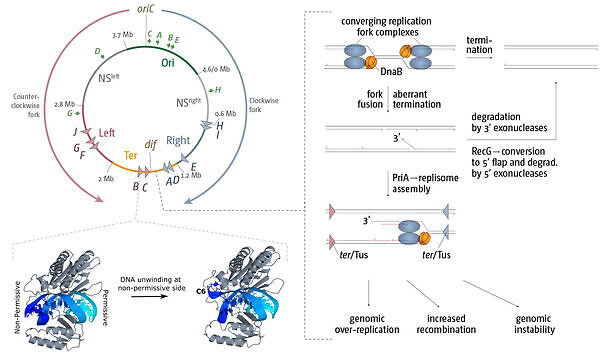"Successfully completing the final stretch – termination of DNA replication in bacteria" by Dr. Christian Rudolph

Date
Location
Description
Dr. Christian Rudolph will give a seminar via zoom from Brunel University London about termination of DNA replication in bacteria. Anyone interested can join, either via zoom or in Lab 4 room E26. Please find below the zoom link and the abstract. For any questions please contact samuelcyrus.cure@oist.jp
-------------------------------
Zoom link:
https://oist.zoom.us/j/96955282965?pwd=ZnlEbUN3OEZhZjlka1lZeGZCMzFOQT09
Meeting ID: 969 5528 2965
Passcode: 282636
-------------------------------------
Abstract:
Replication termination, the final stage of genome duplication, is a highly complex process, and failures in bringing DNA synthesis to an accurate conclusion can have catastrophic consequences for cell viability and genome stability. While initiation and elongation of DNA replication are well understood, termination has received little attention. It was simply assumed that two converging replication fork complexes would fuse, followed by the disassembly of the replisomes and ligation of the nascent strands. But recent data have revealed that fork fusions have to be extensively choreographed, both in prokaryotic and eukaryotic cells.
Our research in Escherichia coli has shown that a wide variety of proteins are involved in the processing of fork fusion intermediates. If such factors are missing, substantial levels of over-replication are observed, which trigger localised levels of hyper-recombination. In E. coli, fork fusions are normally taking place in a specialised termination area opposite the origin. This area contains a “replication fork trap”, which allows replication complexes to enter but not leave, thereby ensuring termination takes place in this particular chromosomal area. By forcing forks to fuse ectopically we were able to show how this specialised termination area can efficiently contain some of the problems and pathologies associated with termination. However, having a fork trap area comes with its own problems: our in vitro reconstitution of a fork fusion event that takes place directly at a ter-Tus complex showed that a stretch of the chromosome remains under-replicated, which will require additional helicases for completion. Our results highlight the complexity associated with termination in bacteria and the significant problems that can be triggered if fork fusion events go awry, thereby supporting the idea that the replication fork trap has an important physiological role that provides an evolutionary advantage.
Subscribe to the OIST Calendar: Right-click to download, then open in your calendar application.



